 MyCatBreeds
MyCatBreeds Devon Rex is originated from United Kingdom but American Keuda is originated from United States. Both Devon Rex and American Keuda are having almost same weight. Both Devon Rex and American Keuda has almost same life span. Both Devon Rex and American Keuda has same litter size. Both Devon Rex and American Keuda requires Low maintenance.
Devon Rex is originated from United Kingdom but American Keuda is originated from United States. Both Devon Rex and American Keuda are having almost same weight. Both Devon Rex and American Keuda has almost same life span. Both Devon Rex and American Keuda has same litter size. Both Devon Rex and American Keuda requires Low maintenance.
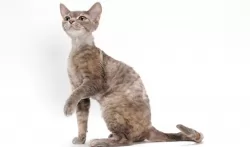 The Devon Rex is a cat known for its large ears and its curly, soft coat. It hails from England, emerging in the 1950s.
The Devon Rex is a cat known for its large ears and its curly, soft coat. It hails from England, emerging in the 1950s.
The cat is recognized by quite a few cat associations. The first of these cats was discovered by Beryl Cox in 1959 in Buckfastleigh, Devon. When the cat started appearing in cat shows in the UK, people starting becoming interested in owning these unusual cats.
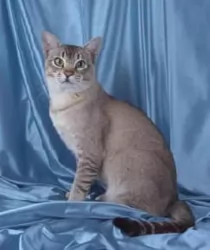 It is thought that the cat was brought to America by the Spanish to keep the rat population down.
It is thought that the cat was brought to America by the Spanish to keep the rat population down.
The name KEUDA stands for Kitten Evaluation Under Direct Assessment which is actually the name of a program that was running in Texas, Oklahoma and New Mexico and was for investigating the kinds of cats that survived as barn cats.
Today the Keuda isn’t registered and it’s not a well-known cat either, being looked upon as being similar to the Egyptian Mau breed as it shares some physical similarities with the Mau.
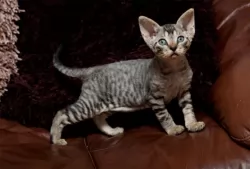 Known for its slender, light build, and weighing roughly between 2 and 4kg, the medium-sized Devon Rex has large, rounded ears. It is the large, rounded ears, set low on the sides of the broad head that make it slightly gremlin-like in appearance.
Known for its slender, light build, and weighing roughly between 2 and 4kg, the medium-sized Devon Rex has large, rounded ears. It is the large, rounded ears, set low on the sides of the broad head that make it slightly gremlin-like in appearance.
Their eyes are also large, and their noses are slightly upturned. It’s short, curly coat is another unusual feature and comes in many colors and patterns. The eyes can be blue, yellow, copper or he can be odd-eyed.
Your Devon Rex is quite a naughty cat, enjoying getting up to all kinds of mischief. Energetic, they love leaping up high onto perches so you’ll often find your Devon Rex in odd spots, more so if it's a spot in the sun as he loves warmth. It is why it is important to buy a cat tree for this cat.
It’s a loving, loyal cat and it will attach itself to one member of the family and then they are capable of pouring out the love and affection on this particular person. They’re also playful cats, as well as being intelligent.
He can learn a few tricks and can also be trained to walk on a leash. This is an active, energetic breed and will provide his human family with hours of amusing entertainment.
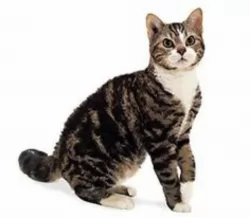 You can’t really pin-point what the American Keuda looks like as it looks a lot like the Maus but it can also look like a Siamese cat or even others.
You can’t really pin-point what the American Keuda looks like as it looks a lot like the Maus but it can also look like a Siamese cat or even others.
It is a medium-sized cat and can weigh up to 5 or 6kg while being very lithe and athletic. The head of the cat is medium-sized, the ears medium-large, the eyes almond-shaped, and the tail is slightly tapered.
An unusual aspect with this cat is its belly flap – loose skin that flaps at each elbow. The head is wedge-shaped, it has almond-shaped eyes, large ears and the fur is soft and silky and in a variety of patterns as well as solid colors. The coat is short to medium in length and there is no undercoat.
American Keudas are just your regular cat in personality - active, adaptable, inquisitive, and intelligent while being strong and agile.
They are also adaptable and social, getting along well with children as well as other pets in the home. It is also quite unusual in that it likes playing with water. They are also playful and love running, jumping and climbing and indoors it will want a climbing cat tree.
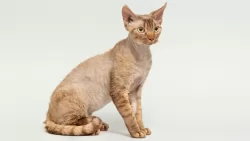 Your Devon Rex is a social cat and is happy to be found on your lap. He doesn’t take kindly to being left on his own though. He isn’t a suitable fit for someone who works all day.
Your Devon Rex is a social cat and is happy to be found on your lap. He doesn’t take kindly to being left on his own though. He isn’t a suitable fit for someone who works all day.
If you love animals, then maybe another companion animal would be a good idea as he is an amicable cat and gets on well with other animals.
When you spend time with your cat, make sure it is a special time, full of treats and stimulating play as he will learn to even fetch a small ball.
Just give him lots of attention and he’ll be your provider of companionship and entertainment.
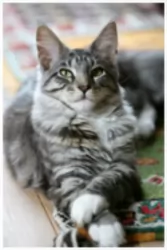 The beauty of American Keuda cats is that they are no-fuss cats and they are energetic, amicable, social, and playful and they make wonderful companions.
The beauty of American Keuda cats is that they are no-fuss cats and they are energetic, amicable, social, and playful and they make wonderful companions.
They are also fond of water and can even strike up a friendship with your dog. By bringing a Keuda into your home you can rely on a steady, loving friendship with your feline friend.
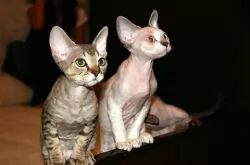 This particular cat isn’t known for any extreme health issues but even so, there are some health problems that are important to know about -
This particular cat isn’t known for any extreme health issues but even so, there are some health problems that are important to know about -
This is where the patella or knee cap moves out of its usual spot. It can occur because of a number of reasons such as an injury or congenital malformation. The vet will want x-rays because sometimes hip dysplasia is also present.
This is an inherited condition seen in both male and female cats and usually in young kittens. The cat has an odd gait with a head that bobs along as is tries to walk. The cat has tremors and also has difficulty with swallowing. With a visit to the vet and special care, your cat can do well.
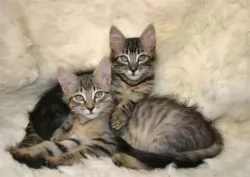 Thes cats enjoy good health and live to be 15 years of age or older even. You just have to watch out for him as they have no undercoats and it’s not a cat to do well in the cold.
Thes cats enjoy good health and live to be 15 years of age or older even. You just have to watch out for him as they have no undercoats and it’s not a cat to do well in the cold.
Whenever you buy a cat for the first time, try and find out about vaccines and previous conditions that might require special treatment.
Healthy kittens and cats are always alert and energetic with shiny coats and clear eyes.
Dental disease is quite common in cats, and it is always a good idea to have your pet’s teeth checked by your vet. Signs of pain with dental problems can include lethargy, pawing at the mouth, facial swelling, and reduced appetite. Get your cat immediately to the vet if you suspect problems with his teeth.
Neutering and spaying are imperative if you don’t want your pet to have kittens. It’s a simple operation for your pet and it comes with many health benefits for your cat. You don’t want your female cat having kittens as there are just already so many stray cats in shelters. Spaying and neutering mellows a cat too, makes them less prone to wandering, spraying, and fighting.
Make sure you have your American Keuda vaccinated against the many cat diseases that there are. Vaccinations are available against feline infectious enteritis or feline parvovirus, cat flu and feline leukemia virus, a disease that damages the cat’s immune system. Kittens require their first vaccine at around 8 weeks of age.
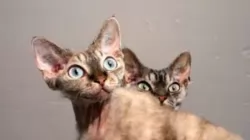 The Devon rex cat breed is known for its unusual looks with its wavy fur, large ears and large eyes. It is considered a rare breed and you want to make sure that you take proper care of him.
The Devon rex cat breed is known for its unusual looks with its wavy fur, large ears and large eyes. It is considered a rare breed and you want to make sure that you take proper care of him.
Owners of the Devon Rex know that these cats love their food and it has to be top quality food to enhance good feline health.
Cats are carnivores, ad this actually means that they should stick to a meat diet. Any food you buy your cat should be mainly meat. Look at the packaging of the commercially manufactured cat foods you want to buy, and make sure that the first few ingredients are some sort of meat.
Remember that any uncertainty with feeding your cat, you can chat with your vet.
Keep the inside of your cat’s ear free of an accumulation of wax and dirt as well as infection. If you don’t like the idea of probing in your cat’s ears, be in contact with your vet or a reputable, professional cat groomer.
Trim the cat’s nails.
Check inside his mouth for bad teeth as this could be causing him pain.
Clean your cat’s litter box every single day and also replace the grit regularly.
Get your cat veterinary care as soon as he shows signs of illness. Certainly, make sure all his vaccines and deworming are up to date.
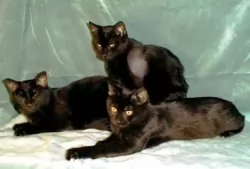 Every cat needs to be fed a complete, balanced high-in-protein food. There are heaps of different brands of cat food on the market - wet and dry. Always follow the manufacturer’s instructions and recommended amounts. If in any doubt about what to feed your cat, speak to your vet. Every cat needs a constant supply of fresh, cool water.
Every cat needs to be fed a complete, balanced high-in-protein food. There are heaps of different brands of cat food on the market - wet and dry. Always follow the manufacturer’s instructions and recommended amounts. If in any doubt about what to feed your cat, speak to your vet. Every cat needs a constant supply of fresh, cool water.
Both young and older cats love to play so ensure you provide your cat with stimulating toys as well as things such as climbing trees and a scratching post. Cats enjoy a high-up place where they can feel safe and view their surroundings from a height.
Cats spend many hours a day sleeping and you need to provide your cat with a warm, dry, comfortable, quiet place to rest. There are many cat beds available, but if you don’t have one, a cardboard box with one side removed and a soft cushion or blanket will do.
Invest in a litter box for your cat to do his business in and keep it in a safe, quiet place where your cat can ‘toilet’ in peace and quiet. These should be placed away from the food and water bowls. Make sure to keep a small plastic rake close by and rake up the cat droppings regularly to ensure the litter tray is nice and clean.
Your American Keuda is a short-haired cat but you want to brush the fur gently at least once a week. Grooming also provides you and your cat with some valuable bonding time.
Provide your cat with a collar to show everyone that he is yours. Also, have your cat microchipped – a tiny chip that carries your pet’s unique ID number and which is inserted safely and gently under the cat's skin.
Have your cat treated and free from parasites such as ticks, fleas, and worms. Speak to your vet about this.